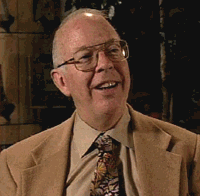Coordinated
Management of Meaning |
|
 <a onClick="window.open('/olcweb/cgi/pluginpop.cgi?it=jpg:: ::/sites/dl/free/007248392x/43371/image42.jpg','popWin', 'width=250,height=266,resizable,scrollbars');" href="#"><img valign="absmiddle" height="16" width="16" border="0" src="/olcweb/styles/shared/linkicons/image.gif"> (6.0K)</a> <a onClick="window.open('/olcweb/cgi/pluginpop.cgi?it=jpg:: ::/sites/dl/free/007248392x/43371/image42.jpg','popWin', 'width=250,height=266,resizable,scrollbars');" href="#"><img valign="absmiddle" height="16" width="16" border="0" src="/olcweb/styles/shared/linkicons/image.gif"> (6.0K)</a>
| "Do you have to give up your belief in a divine being, a transcendent
story, or a master narrative if you're a CMM theorist? My answer is, 'No,
you don't.' But what you do have to do is to start giving attention to
the kind of social world that you create when you affirm that belief in
certain ways." Barnett Pearce |
|
| |
Expectancy
Violations Theory |
|
 <a onClick="window.open('/olcweb/cgi/pluginpop.cgi?it=jpg:: ::/sites/dl/free/007248392x/43371/image01.jpg','popWin', 'width=250,height=264,resizable,scrollbars');" href="#"><img valign="absmiddle" height="16" width="16" border="0" src="/olcweb/styles/shared/linkicons/image.gif"> (6.0K)</a> <a onClick="window.open('/olcweb/cgi/pluginpop.cgi?it=jpg:: ::/sites/dl/free/007248392x/43371/image01.jpg','popWin', 'width=250,height=264,resizable,scrollbars');" href="#"><img valign="absmiddle" height="16" width="16" border="0" src="/olcweb/styles/shared/linkicons/image.gif"> (6.0K)</a>
| "A theory is nothing more than your set of systematic hunches about the
way things operate. The point of trying to test theory is to see if your
hunches work out." Judee Burgoon |
|
| |
Interpersonal Deception Theory |
|
 <a onClick="window.open('/olcweb/cgi/pluginpop.cgi?it=jpg:: ::/sites/dl/free/007248392x/43371/image02.jpg','popWin', 'width=250,height=264,resizable,scrollbars');" href="#"><img valign="absmiddle" height="16" width="16" border="0" src="/olcweb/styles/shared/linkicons/image.gif"> (5.0K)</a> <a onClick="window.open('/olcweb/cgi/pluginpop.cgi?it=jpg:: ::/sites/dl/free/007248392x/43371/image02.jpg','popWin', 'width=250,height=264,resizable,scrollbars');" href="#"><img valign="absmiddle" height="16" width="16" border="0" src="/olcweb/styles/shared/linkicons/image.gif"> (5.0K)</a>
| "Ekman has written, "People overestimate the extent to which their deception benefits other people." I think that's probably true. There's a lot of instrumental value to me if I'm the deceiver." David Buller |
|
| |
Constructivism |
|
 <a onClick="window.open('/olcweb/cgi/pluginpop.cgi?it=jpg:: ::/sites/dl/free/007248392x/43371/image03.jpg','popWin', 'width=346,height=270,resizable,scrollbars');" href="#"><img valign="absmiddle" height="16" width="16" border="0" src="/olcweb/styles/shared/linkicons/image.gif"> (9.0K)</a> <a onClick="window.open('/olcweb/cgi/pluginpop.cgi?it=jpg:: ::/sites/dl/free/007248392x/43371/image03.jpg','popWin', 'width=346,height=270,resizable,scrollbars');" href="#"><img valign="absmiddle" height="16" width="16" border="0" src="/olcweb/styles/shared/linkicons/image.gif"> (9.0K)</a>
Jim Applegate, Brandt Burleson, Jessie Delia
| "Some people stay open; they have new experiences. As those experiences
reshape their constructs, they change." Jesse Delia |
|
| |
Uncertainty Reduction Theory |
|
 <a onClick="window.open('/olcweb/cgi/pluginpop.cgi?it=jpg:: ::/sites/dl/free/007248392x/43371/image04.jpg','popWin', 'width=250,height=265,resizable,scrollbars');" href="#"><img valign="absmiddle" height="16" width="16" border="0" src="/olcweb/styles/shared/linkicons/image.gif"> (5.0K)</a> <a onClick="window.open('/olcweb/cgi/pluginpop.cgi?it=jpg:: ::/sites/dl/free/007248392x/43371/image04.jpg','popWin', 'width=250,height=265,resizable,scrollbars');" href="#"><img valign="absmiddle" height="16" width="16" border="0" src="/olcweb/styles/shared/linkicons/image.gif"> (5.0K)</a>
| "Part of the use of ambiguity in the creation of theory is to hedge against
the potential of being wrong. You can't take that attitude and do social
science well . . . You've got to be willing to risk
being wrong." Chuck Berger |
|
| |
Relational
Dialectics |
|
 <a onClick="window.open('/olcweb/cgi/pluginpop.cgi?it=jpg:: ::/sites/dl/free/007248392x/43371/image05.jpg','popWin', 'width=250,height=263,resizable,scrollbars');" href="#"><img valign="absmiddle" height="16" width="16" border="0" src="/olcweb/styles/shared/linkicons/image.gif"> (6.0K)</a> <a onClick="window.open('/olcweb/cgi/pluginpop.cgi?it=jpg:: ::/sites/dl/free/007248392x/43371/image05.jpg','popWin', 'width=250,height=263,resizable,scrollbars');" href="#"><img valign="absmiddle" height="16" width="16" border="0" src="/olcweb/styles/shared/linkicons/image.gif"> (6.0K)</a>
| "We are subject to cultural messages that tend to portray relationships
as much simpler than they are, much more idealized than they are, much
more smoothly unfolding than they are. Rather than aim for that ideal,
I think we should enjoy the messiness of them." Barbara Montgomery |
|
| |
Functional Perspective on Group Decision Making |
|
 <a onClick="window.open('/olcweb/cgi/pluginpop.cgi?it=jpg:: ::/sites/dl/free/007248392x/43371/image06.jpg','popWin', 'width=250,height=264,resizable,scrollbars');" href="#"><img valign="absmiddle" height="16" width="16" border="0" src="/olcweb/styles/shared/linkicons/image.gif"> (5.0K)</a> <a onClick="window.open('/olcweb/cgi/pluginpop.cgi?it=jpg:: ::/sites/dl/free/007248392x/43371/image06.jpg','popWin', 'width=250,height=264,resizable,scrollbars');" href="#"><img valign="absmiddle" height="16" width="16" border="0" src="/olcweb/styles/shared/linkicons/image.gif"> (5.0K)</a>
| "If you and I went to Las Vegas armed with the knowledge of the functional
theory, and we used our knowledge of the theory to predict whether the
group would make a good decision or a bad decision, we would win more
times than we would lose . . . Seventy percent of
the time we would be correct and thirty percent of the time we would be
wrong." Randy Hirokawa |
|
| |
Adaptive
Structuration Theory |
|
 <a onClick="window.open('/olcweb/cgi/pluginpop.cgi?it=jpg:: ::/sites/dl/free/007248392x/43371/image07.jpg','popWin', 'width=250,height=264,resizable,scrollbars');" href="#"><img valign="absmiddle" height="16" width="16" border="0" src="/olcweb/styles/shared/linkicons/image.gif"> (5.0K)</a> <a onClick="window.open('/olcweb/cgi/pluginpop.cgi?it=jpg:: ::/sites/dl/free/007248392x/43371/image07.jpg','popWin', 'width=250,height=264,resizable,scrollbars');" href="#"><img valign="absmiddle" height="16" width="16" border="0" src="/olcweb/styles/shared/linkicons/image.gif"> (5.0K)</a>
| "The core idea of this theory is that members in groups are creating
the group as they act within it. A lot of times people in groups build
up structures or working arrangements that are very uncomfortable for
them and they don't realize they are doing it." Scott Poole |
|
| |
Critical Theory of Communication Approach to Organizations |
|
 <a onClick="window.open('/olcweb/cgi/pluginpop.cgi?it=jpg:: ::/sites/dl/free/007248392x/43371/image08.jpg','popWin', 'width=250,height=264,resizable,scrollbars');" href="#"><img valign="absmiddle" height="16" width="16" border="0" src="/olcweb/styles/shared/linkicons/image.gif"> (6.0K)</a> <a onClick="window.open('/olcweb/cgi/pluginpop.cgi?it=jpg:: ::/sites/dl/free/007248392x/43371/image08.jpg','popWin', 'width=250,height=264,resizable,scrollbars');" href="#"><img valign="absmiddle" height="16" width="16" border="0" src="/olcweb/styles/shared/linkicons/image.gif"> (6.0K)</a>
| "A lot of managers talk about "thinking out of the box," but they don't
understand the communication process by which that happens. You do not think out of the box by commanding the box! You think out of the box precisely by bringing ideas together that don't allow dominant ideas to continue to dominate." Stan Deetz |
|
| |
NEW! Agenda-Setting Theory |
|
 <a onClick="window.open('/olcweb/cgi/pluginpop.cgi?it=gif:: ::/sites/dl/free/007248392x/43371/image40.gif','popWin', 'width=250,height=266,resizable,scrollbars');" href="#"><img valign="absmiddle" height="16" width="16" border="0" src="/olcweb/styles/shared/linkicons/image.gif"> (22.0K)</a> <a onClick="window.open('/olcweb/cgi/pluginpop.cgi?it=gif:: ::/sites/dl/free/007248392x/43371/image40.gif','popWin', 'width=250,height=266,resizable,scrollbars');" href="#"><img valign="absmiddle" height="16" width="16" border="0" src="/olcweb/styles/shared/linkicons/image.gif"> (22.0K)</a>
| "If you are exposed enough to a particular agenda whether it's a news agenda or the Jay Leno agenda or whatever... and if that resonates, people are going to respond. They're going to perceive those elements, whatever they are, as important." Max McCombs |
|
| |
Face
Negotiation Theory |
|
 <a onClick="window.open('/olcweb/cgi/pluginpop.cgi?it=jpg:: ::/sites/dl/free/007248392x/43371/image09.jpg','popWin', 'width=250,height=263,resizable,scrollbars');" href="#"><img valign="absmiddle" height="16" width="16" border="0" src="/olcweb/styles/shared/linkicons/image.gif"> (6.0K)</a> <a onClick="window.open('/olcweb/cgi/pluginpop.cgi?it=jpg:: ::/sites/dl/free/007248392x/43371/image09.jpg','popWin', 'width=250,height=263,resizable,scrollbars');" href="#"><img valign="absmiddle" height="16" width="16" border="0" src="/olcweb/styles/shared/linkicons/image.gif"> (6.0K)</a>
| "We can never capture the immense diversity of human behavior in the
broad label of this big colossal concept called the Mexican culture of
the U.S. culture." Stella Ting-Toomey |
|
| |
Speech
Codes Theory (The Ethnography of Communication) |
|
 <a onClick="window.open('/olcweb/cgi/pluginpop.cgi?it=jpg:: ::/sites/dl/free/007248392x/43371/image10.jpg','popWin', 'width=250,height=264,resizable,scrollbars');" href="#"><img valign="absmiddle" height="16" width="16" border="0" src="/olcweb/styles/shared/linkicons/image.gif"> (6.0K)</a> <a onClick="window.open('/olcweb/cgi/pluginpop.cgi?it=jpg:: ::/sites/dl/free/007248392x/43371/image10.jpg','popWin', 'width=250,height=264,resizable,scrollbars');" href="#"><img valign="absmiddle" height="16" width="16" border="0" src="/olcweb/styles/shared/linkicons/image.gif"> (6.0K)</a>
| "If you look at most introductory books on interpersonal communication
you very likely will find a part that deals with self-disclosure--how
to reveal the self . . . If a traditional Sioux
were to write a book on interpersonal communication it would be very different.
There would be a whole chapter on pledges, promises and vows." Gerry Philipsen |
|
| |
| |
NEW! Muted Group Theory |
 <a onClick="window.open('/olcweb/cgi/pluginpop.cgi?it=gif:: ::/sites/dl/free/007248392x/43371/image41.gif','popWin', 'width=242,height=252,resizable,scrollbars');" href="#"><img valign="absmiddle" height="16" width="16" border="0" src="/olcweb/styles/shared/linkicons/image.gif"> (13.0K)</a> <a onClick="window.open('/olcweb/cgi/pluginpop.cgi?it=gif:: ::/sites/dl/free/007248392x/43371/image41.gif','popWin', 'width=242,height=252,resizable,scrollbars');" href="#"><img valign="absmiddle" height="16" width="16" border="0" src="/olcweb/styles/shared/linkicons/image.gif"> (13.0K)</a>
| "Anyone who wants to challenge some of those established practices and take a look at unequal treatment can certainly use that term [feminist]." Cheris Kramarae |
|




